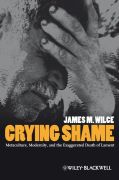
For millennia, lamenting – expressing grief through crying songs, often in a collective ritual context – both sustained and challenged communities around the world. In recent centuries, however, communities that once joined together in lament have rejected it, in apparent shame. Building on ethnographic fieldwork and extensive historical evidence, James Wilce analyzes lament across thousands of years and nearly every continent, illustrating human commonalities and cultural diversity. In doing so, he offers a new perspective on modernity and postmodernity by demonstrating their fundamental relationship to lament. INDICE: Preface. Acknowledgements. 1. Introduction. Part I: Locating Lament as Object:. 2. For Crying Out Loud, What is Lament Anyway?. 3. Lament and Emotion. 4. Antiquity, Metaculture, and the Control of Lament. Part II: Losing Lament: Modernity as Loss:. Introduction to Part II. 5. Cultural Amnesia and the Objectification of Lament in Bangladesh. 6. Modern Transformations. 8. Crying Backward: Primitivist Representations of Lament. Part III: "Reviving Lament": Lament as Key Trope of Modernity:. Introduction to Part III. 9. Mourning Becomes the Electron's Age: Lamenting Modernity(ies). 10. Lament's (Post)Modern Vertigo: Floating in a Deterritorialized Media Sea. 11. Lament in a Postmodern World of Revivals. 12. Conclusion. References. Endnotes
- ISBN: 978-1-4051-6992-9
- Editorial: Blackwell
- Encuadernacion: Cartoné
- Páginas: 296
- Fecha Publicación: 07/11/2008
- Nº Volúmenes: 1
- Idioma: Inglés
